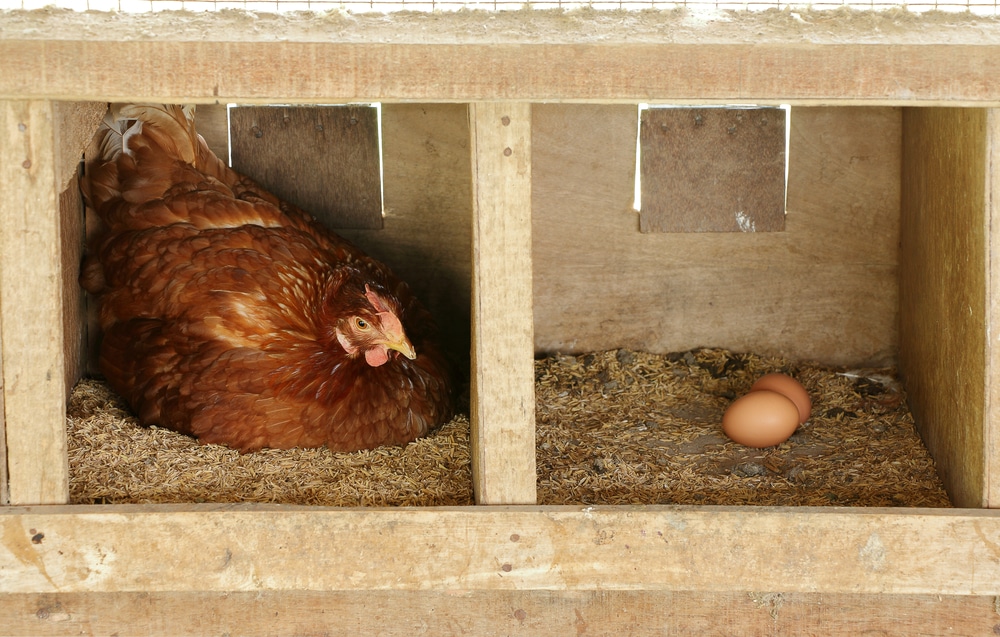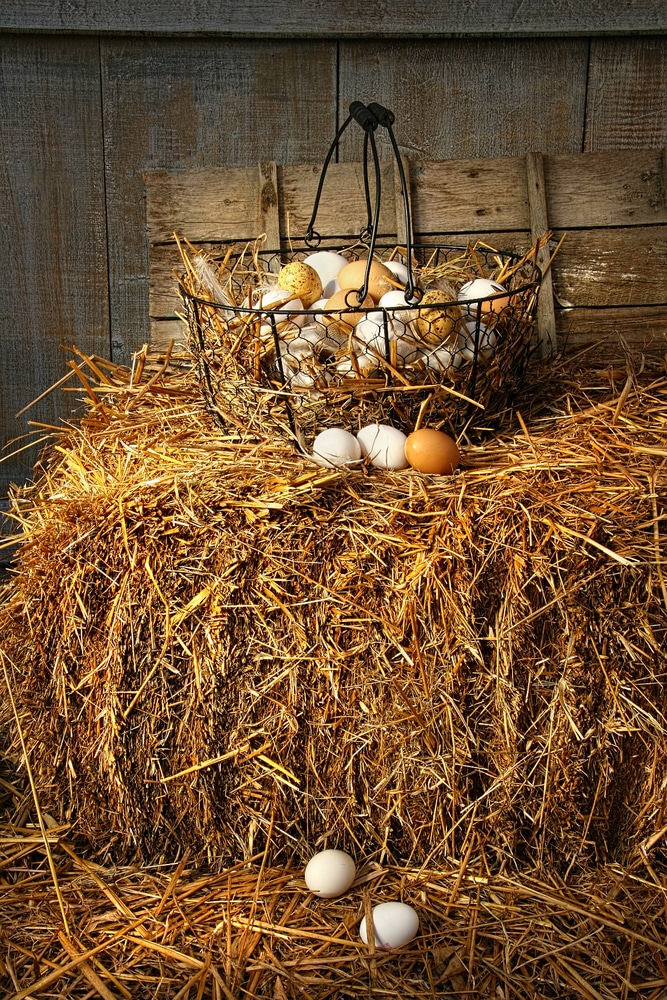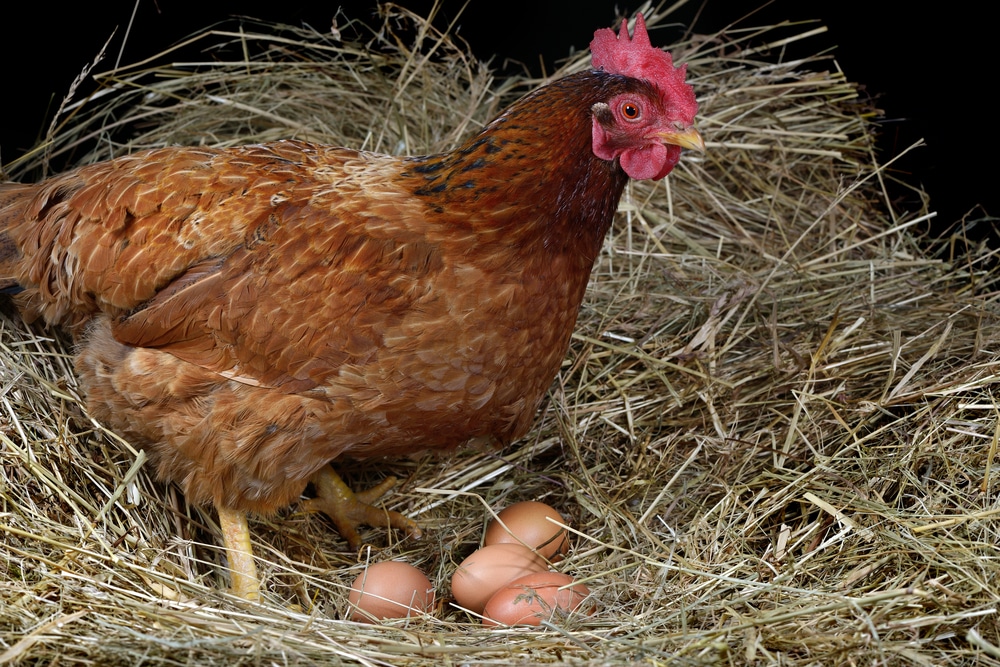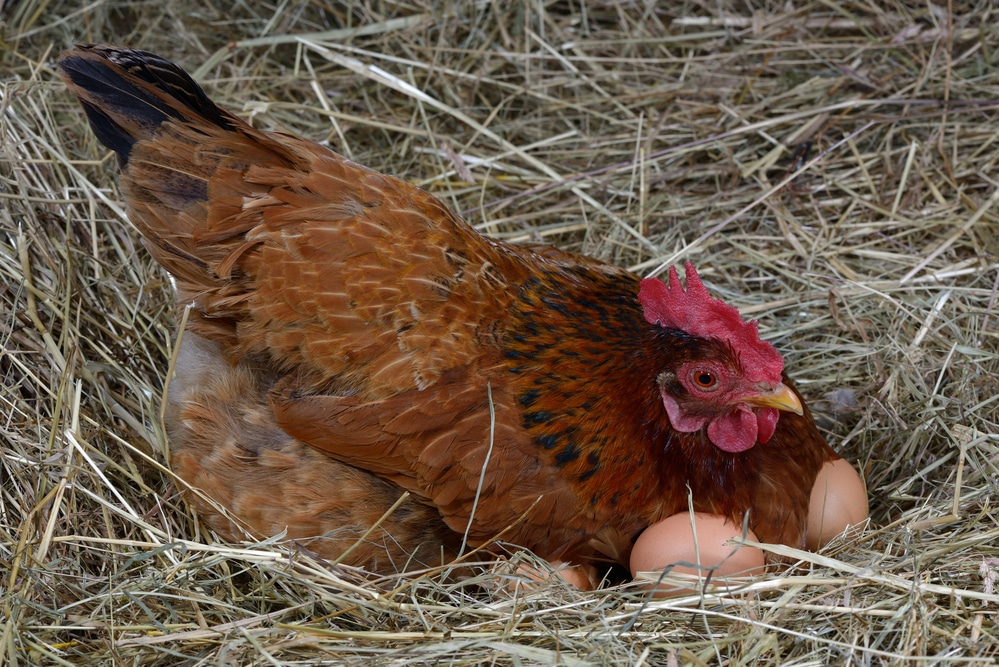If you have just started raising chickens, you’re probably wondering when, exactly, you will see your first egg.
Hold on, though – don’t rush things!
If you just brought your flock home – or if you just hatched your own baby chicks – you are probably going to have to wait a little bit before you start reaping the rewards of owning chickens.
A chicken isn’t born with the ability to lay an egg. There are several factors that come into play when it comes to egg production, and time is one of the most significant components.
However, if you’re wondering whether your chickens are going to start laying eggs soon – and how you can encourage them to start – there are a few guidelines you can follow.
First of all, know that happy and healthy hens will produce a ton of eggs – and that the best way to encourage egg laying is to ensure the health of your backyard flock.
Besides that, patience – and a little bit of experience in raising chickens! – are key.
Here’s what you need to know.
When Do Chickens Normally Start to Lay?
The first thing you need to be aware of if you are growing impatient while waiting for your chickens to start laying eggs is that time is the biggest factor.
Your chickens won’t start laying eggs until they are ready. Newborn chicks will not be dropping out dozens of eggs anytime soon, and most breeds of chickens, in fact, cannot lay their first eggs until they’re six months old at a minimum.
Now, this does vary a bit among the breed.
Some chickens can lay long before that time, while others will take much longer for this biological process to kick in.
What Factors Influence Laying?

Here are a few important factors that influence egg laying:
Timing and the Time of the Year
If it’s December when you’re reading this article, don’t expect your hens to start laying eggs, even if they are at the mature age necessary to do so.
Often, hens will not lay eggs during the coldest, darkest parts of winter – and they may hold off until spring gets here.
The “six-month” mark as an estimate for when your hens will start to lay is merely that – an estimate.
There are numerous factors involved in egg production and while some birds will produce eggs all year, others will stop laying during certain times of the year.
It’s not just the cold, dark winter months that can bring lying to a grinding halt, either.
Seasonal changes in your birds like broodiness and molting can cause a stop in laying (or a failure to begin laying altogether).
Breed
Breed is one of the biggest factors when it comes to hens laying eggs. While most chickens start to lay eggs when they are six months old, this varies based on the chicken breed.
As a general rule of thumb, heavy chicken breeds, such as Plymouth Rocks, Wyandottes, and Orpingtons, are more likely to lay much later.
Smaller breeds such as Australrops and Leghorns lay much sooner. This can vary within a flock, though, too – even if you have a whole flock that consists only of Australorps, they are not all going to start laying at the exact same time like clockwork.
Some hybrid chicken breeds are bred for commercial egg production – and also to begin laying earlier, too. These include Golden Comets and other sex-link birds. However, keep in mind that there is a trade-off here.
Although these chickens start to lay eggs much sooner, they generally won’t lay for quite as long. Their life spans tend to be much shorter.
Flock Dynamics
As you probably already know, chickens abide by the pecking order.
Regardless of your flock size, you are always going to have a “queen bee” who reigns supreme over the rest of the flock -as well as those who are at the very bottom of the pecking order.
These flock dynamics are not to be interfered with. Adding or removing chickens from a flock can change the pecking order, throwing the entire cycle of your birds out of whack.
Make sure you are careful about how you introduce new chickens, doing so thoughtfully and slowly to prevent any issues.

How to Get Chickens to Lay Eggs – Our Top Tips
Here are a few actionable tips to encourage your chickens to lay eggs:
Ensure Proper Health
The easiest – and best – way to convince your chickens to lay is to provide them with the best possible living conditions.
If chickens are stressed or ill, you are going to notice a delay in the beginning or continuation of egg production.
Parasites are the most common illnesses, but there are other equally harmful diseases like coccidiosis and fowlpox, that can significantly impact a hen’s egg production.
Keeping a clean, sanitary coop and run is the easiest way to combat chicken diseases, as is providing proper nutrition and safe drinking water.
However, you also need to be careful about buying your chickens.
Only buy birds from a safe source – also, be overly cautious when adding new chickens to your flock.
Warm Things Up
If you can’t get you then to lay eggs – especially if she’s laid eggs in the past – and broodiness or molting are not factors, consider the internal coop temperature as well as the temperature outside.
If it’s winter, that’s probably why she’s not lying – but it could be that your coop is too cold, too.
You do not need to heat your coop, and most of the time, chickens do just fine in unheated coops throughout the winter months.
However, if your hens have stopped laying (or never even started), they could be too chilly.
Do a thorough walkthrough of your coop and make sure everything is sealed up tight. If there are large air gaps in the coop – often a result of damage or rotting wood – you can patch them up with cut-to-size pieces of plywood.
Add some extra bedding to the coop and nest boxes, and consider using the deep litter method of bedding your coop – this will add heat to the coop as the chicken manure and bedding material decompose into compost.
While a warm coop is essential in increasing the likelihood that your chickens will lay eggs, you don’t want it to be too sealed up.
Eliminate drafts, but also make sure there is ventilation.
Add vents to the top of the coop – this way, warm, moist air from your chickens’ breath can rise and find its way out of the coop while letting in drier air to keep things flowing.
Supplement Nutrition
Proper nutrition can seriously impact chickens who are beginning to lay. Make sure that you are offering a well-balanced, highly nutritious feed.
Most commercial feeds do a great job of providing your chickens with everything they need to lay.
However, it’s important that you look at the nutritional values of your feed to make sure they are where they need to be in regards to protein, vitamins, and minerals.
Of particular importance is calcium. For the first six weeks of life, chicks need chick starter feed – which is about 22 percent protein.
You can lower the protein quantities until your birds start laying – then, you need to switch to a layer feed that contains additional protein and calcium.
If you have not yet switched your flock over to a layer feed and they are at the age where lying is expected, switch them over now.
This kind of feed contains the extra calcium your girls need for egg production.
If you raise a mixed flock that includes roosters, avoid feeding layer feed. The extra calcium can be damaging to the internal organs of your roosters, as they do not need the calcium for egg production.
Instead, put out a supplement that contains oyster shells or even ground-up eggshells. This will contain just as much calcium, and your roosters won’t eat it – the hens can go after it free choice instead.
Not only is the type of feed important when it comes to getting hens ready to lay, but the quantity is, too.
Make sure you provide your hens with free choice food and don’t restrict them. It can prevent a lot of health problems.
Prevent Parasites
Chickens aren’t going to lay eggs if they feel stressed in any way – and that includes if they are sick or being harassed by parasites.
There are several parasites that may afflict your backyard flock. Internal parasites can cause symptoms like watery feces, pale combs, a drop in egg production, or even a failure to commence egg production to begin with.
Prevent parasites from the get-go by incorporating a regular natural deworming regimen.
While most people don’t use chemical dewormers as a preventative method (nor should you, as this can cause other health problems), you can engage in some natural preventative care.
For instance, add a scoop of garlic to the feed to remove parasites, practice rotational grazing, and keep the coop nice and clean.
Some people mix diatomaceous earth into the feed. This is generally a good practice, as is mixing diatomaceous earth into your chickens’ dust baths.
Chickens aren’t just at risk of picking up internal parasites – they can also acquire external ones, too.
These are just as harmful to regular laying behaviors as internal parasites, so make sure you’re keeping things clean to prevent external parasites, like chicken mites, too.
Make Sure They Aren’t Eating Eggs
If you know for sure that your hens started laying eggs and you simply aren’t finding any in the nest boxes, your problem might not be that your hens aren’t laying – but that they are eating the ones they do lay.
This is a major problem in raising chickens that is often difficult to combat.
You can prevent your birds from eating eggs by covering your nest boxes with curtains, preventing egg breakage by collecting laid eggs promptly, and adding a calcium supplement.
However, once a hen has a taste for eggs it might be difficult to get her to stop – and you may have to cull her.
Signs that your hens are laying eggs but then eating them include broken eggs in the nest box as well as actually viewing a hen pecking at her own (or other hens’) eggs.
Build Good Nest Boxes
Hens are finicky creatures, and if the nest boxes aren’t to their liking, you may find that your hen begins to lay her eggs somewhere else.
Take a good look around your yard to make sure the eggs your hen is laying aren’t somewhere else…like in a nest under the coop or inside your nice, warm compost bin.
The phrase “if you build it, they will come” has never been truer than when building good nest boxes to encourage your chickens to start laying eggs.
Chickens need plenty of nesting space (room to turn around and then some) as well as plenty of bedding in the nest box. A nesting box filled with poop is not very enticing for a chicken who is about to lay her first egg!
Make sure you have enough boxes for all your hens, too. If you don’t have enough space, you could find that your hens hold onto their eggs, causing egg binding, or choose to lay them elsewhere.
You might also discover that your hens jostle and fight for space in the nest box, leading to broken eggs which then, in turn, leads to egg eating.
You don’t need a nesting box for every chicken. In general, one per every four birds is plenty.
Raise these up and off the floor and make sure they are at least twelve inches wide. Clean them regularly to prevent parasites and poopy eggs, too.
Add A Light
If your chickens have stopped laying and you would like egg production to continue during the winter months, consider adding a supplemental light to the coop.
Chickens often stop laying in the winter months because there are not enough daylight hours to encourage laying. Therefore, you may find that you need a night to get things going.
Just keep in mind that a cessation in laying over the winter months isn’t necessarily a bad thing.
A quick break can be quite healthy for a hen, helping her body rest and rejuvenate before she returns to her typical patterns.
Ensure They Aren’t Molting
If you have had hens for a year or more, molting could be why your chickens stopped laying eggs.
Molting takes place once per year – usually, in early fall or late summer. Molting is the process of losing old feathers and growing new ones.
Molting won’t usually affect hens who haven’t paid their first eggs yet – they need to be a little bit older.
However, if you’ve noticed a sudden decline in the birds’ egg production and it’s late summer or fall, it could be the molt.
During molting, chickens usually won’t lay eggs because their bodies are using too much energy on the molt.
Molting is a stressful time for chickens, so don’t make it more stressful by trying to force egg production. Just wait it out and make sure you are supplying adequate nutrition to your flock.
Eliminate Broodiness
Broodiness, like molting, is probably not going to happen to a hen that hasn’t laid her first egg yet.
However, if you have an older hen that has suddenly stopped laying, broodiness could be to blame.
That being said, broodiness in a younger hen isn’t totally unheard of – in fact, there are some breeds of chickens that will go broody early on, sitting on eggs that they haven’t even laid themselves!
If your hens have gone broody, they aren’t going to lay any more eggs because their energy will be focused on hatching the egg or eggs that they are sitting on.
Some chicken breeds are more prone to broodiness than others, but be patient – most cases of broodiness rarely last more than 21 days.
Revamp Your Coop Security
There are lots of reasons to have a tight, secure coop – and only one of them has to do with egg production.
Of course, you want your chickens to be safe and warm, but you also need to protect them from predators.
Not only can a threat from a predator make a hen hesitant to lay an egg – remember, a scared, stressed hen is not going to lie – but you might find that the eggs that are being laid have been scooped up by predators.
A sure sign that your hen is being stressed by a threat from a predator (which could be a real or just a perceived threat, like if your dog keeps wandering around outside the covered run) is a body checked egg.
This is an egg that has ridges halfway down the shell. Body checking occurs when a hen’s body tries to internally repair eggshell damage caused by stress.
Do a walk-through of your coop and run to make sure there are no compromised areas. Make sure things are secure, as this will encourage your hens to lay eggs.
Make Sure There’s Water
As with feed, your chickens also need plenty of water in order to produce an egg. This is especially true during the hot days of summer.
Ensure that your hens have consistent access to fresh water.
Using an elevated or covered waterer can help, as your chickens won’t be able to drop manure in it – waterers with nipple drinkers are even better.
Try Some Fake Eggs
Sometimes your hens haven’t laid eggs yet simply because the thought hasn’t occurred to them.
You can add a couple of artificial nest eggs in the nest boxes or even throw a few golf balls in there. She will get the idea pretty quickly!
Consider Free Ranging
A chicken who is allowed to free-range will have access to more exercise opportunities and better nutrition than a chicken who is solely raised in a coop or even allowed out into a small run.
If you think that poor nutrition or limited activity might be to blame for a failure to lay eggs, consider putting your birds out on pasture.
Signs Your Hens are Ready to Lay Eggs

If you’ve implemented all of the tips I’ve told you above and there are still no eggs in sight, take a step back for a moment to truly evaluate your chickens.
Keep an eye out for the signs that your hens are getting ready to lay.
Not only will this let you know that you are on the right track, but it will also help you prepare yourself for the onslaught of eggs (we can only hope!) that is about to come.
First, what do you then look like?
Have her comb and wattle become redder or larger? While she won’t look as red or large as a rooster, you may notice that these become more pronounced as she becomes sexually mature.
You may also notice that your hen begins to demonstrate squatting behavior. To test this, place your hand directly above her back.
If she’s getting ready to lay, she may hunker down and spread her wings out – this is a breeding behavior that also indicates your hen is sexually mature (or ready to lay).
Once you see your hen sitting on her nest and straining slightly, perhaps even crowing, cackling, or chattering to the other members of her flock, you’re in luck – you’re about to see your hen lay an egg!
Grab your favorite frying pan and your most beloved egg recipe, because breakfast is served.
